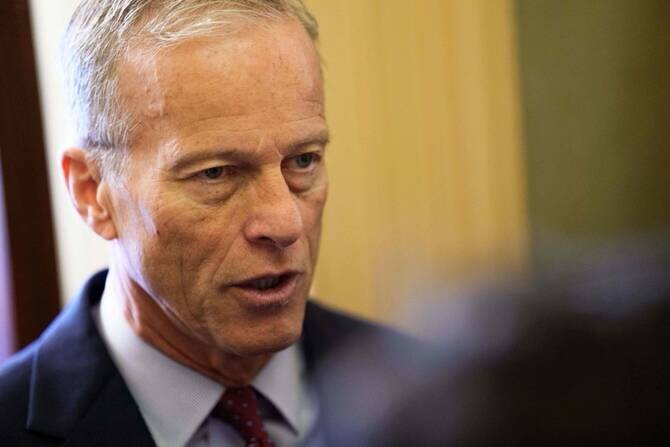
Government Shutdown Deal 'Coming Together' But No Guarantee Of Success
Moderate Democrats and Republicans work on funding legislative package while health care subsidies remain uncertain.
As the Senate held a rare Sunday session, Republican leader John Thune said a potential deal was ‘coming together’ to end the government shutdown now stretching to 40 days.
However, there is no guarantee of success.
Moderate Democrats have been in talks over the weekend to find a compromise to reopen the government, which has disrupted flights nationwide, threatened food assistance for millions, and left federal workers unpaid.
Top Republicans are working with these Democrats to finalize a legislative package that would fund parts of the government through January while also approving full-year funding for certain areas.
The bill may include reversing recent mass layoffs of federal workers.
However, the details remain unclear, and it seems unlikely that the package will extend health care subsidies set to expire at year-end.
Senate Democrats were meeting before a possible test vote on Sunday night.
Thune stated that while a deal is coming together, it is not yet finalized and that they would need to see where the votes lie.
Democrats have already voted 14 times against reopening the government as they demand the extension of tax credits that make coverage more affordable under the Affordable Care Act (ACA).
Republicans have refused to negotiate on health care subsidies while the government remains closed but appear supportive of the emerging proposal from moderate Democrats.
Some Democratic Senators, such as Bernie Sanders and Elissa Slotkin, expressed dissatisfaction with the proposed deal, believing it does not go far enough in addressing health care concerns.
House Democrats also opposed the deal, arguing that it fails to address rising healthcare costs.
The Senate Democrats' leader, Chuck Schumer, made an offer on Friday to reopen the government and extend expiring health care subsidies for a year but was met with immediate rejection from Republicans.
Instead, they are discussing a different path forward with moderate Democrats.
The proposed deal would fund specific parts of the government, such as food aid and veterans programs, through the end of January while extending funding for everything else until that date.
The agreement would also include a future vote on health care subsidies, which has been a longstanding Republican offer.
Some negotiators have discussed reversing some of the mass firings of federal workers during the shutdown but may face resistance from the White House and House Republicans.
The consequences of the shutdown continue to worsen, with US airlines canceling over 2,000 flights on Sunday due to staffing shortages caused by the shutdown.
The shutdown has also affected food aid distribution, resulting in tens of millions going without assistance.
Additionally, federal workers in Washington are still awaiting payment, prompting an increase in demand for food at local banks.
While a deal may be coming together, it remains uncertain whether it will pass, and further negotiations are expected to take place before any votes can be held.
However, there is no guarantee of success.
Moderate Democrats have been in talks over the weekend to find a compromise to reopen the government, which has disrupted flights nationwide, threatened food assistance for millions, and left federal workers unpaid.
Top Republicans are working with these Democrats to finalize a legislative package that would fund parts of the government through January while also approving full-year funding for certain areas.
The bill may include reversing recent mass layoffs of federal workers.
However, the details remain unclear, and it seems unlikely that the package will extend health care subsidies set to expire at year-end.
Senate Democrats were meeting before a possible test vote on Sunday night.
Thune stated that while a deal is coming together, it is not yet finalized and that they would need to see where the votes lie.
Democrats have already voted 14 times against reopening the government as they demand the extension of tax credits that make coverage more affordable under the Affordable Care Act (ACA).
Republicans have refused to negotiate on health care subsidies while the government remains closed but appear supportive of the emerging proposal from moderate Democrats.
Some Democratic Senators, such as Bernie Sanders and Elissa Slotkin, expressed dissatisfaction with the proposed deal, believing it does not go far enough in addressing health care concerns.
House Democrats also opposed the deal, arguing that it fails to address rising healthcare costs.
The Senate Democrats' leader, Chuck Schumer, made an offer on Friday to reopen the government and extend expiring health care subsidies for a year but was met with immediate rejection from Republicans.
Instead, they are discussing a different path forward with moderate Democrats.
The proposed deal would fund specific parts of the government, such as food aid and veterans programs, through the end of January while extending funding for everything else until that date.
The agreement would also include a future vote on health care subsidies, which has been a longstanding Republican offer.
Some negotiators have discussed reversing some of the mass firings of federal workers during the shutdown but may face resistance from the White House and House Republicans.
The consequences of the shutdown continue to worsen, with US airlines canceling over 2,000 flights on Sunday due to staffing shortages caused by the shutdown.
The shutdown has also affected food aid distribution, resulting in tens of millions going without assistance.
Additionally, federal workers in Washington are still awaiting payment, prompting an increase in demand for food at local banks.
While a deal may be coming together, it remains uncertain whether it will pass, and further negotiations are expected to take place before any votes can be held.











